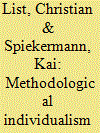| Srl | Item |
| 1 |
ID:
127822


|
|
|
|
|
| Publication |
2013.
|
| Summary/Abstract |
Political science is divided between methodological individualists, who seek to explain political phenomena by reference to individuals and their interactions, and holists (or nonreductionists), who consider some higher-level social entities or properties such as states, institutions, or cultures ontologically or causally significant. We propose a reconciliation between these two perspectives, building on related work in philosophy. After laying out a taxonomy of different variants of each view, we observe that (i) although political phenomena result from underlying individual attitudes and behavior, individual-level descriptions do not always capture all explanatorily salient properties, and (ii) nonreductionistic explanations are mandated when social regularities are robust to changes in their individual-level realization. We characterize the dividing line between phenomena requiring nonreductionistic explanation and phenomena permitting individualistic explanation and give examples from the study of ethnic conflicts, social-network theory, and international-relations theory.
|
|
|
|
|
|
|
|
|
|
|
|
|
|
|
|
| 2 |
ID:
171289


|
|
|
|
|
| Summary/Abstract |
Studies investigating gender gaps in the doctoral training of political science students have focused so far overwhelmingly on the US context. Although important research within this context has made strides in identifying the persistent challenges to women’s incorporation in political methodology, much remains unknown about whether women and men have different experiences in methods training during their PhD programs. We contribute to this debate by analyzing data from an original survey on the methods-training experiences of political science PhD students at different European universities. We assess whether gender gaps exist with respect to PhD students’ methods training and confidence in employing methods skills. Our findings show that women cover significantly fewer methods courses in their doctoral training. When women do participate in methods training, they show levels of method employment similar to their male colleagues. We discuss the implications of these findings in the context of European doctoral training.
|
|
|
|
|
|
|
|
|
|
|
|
|
|
|
|